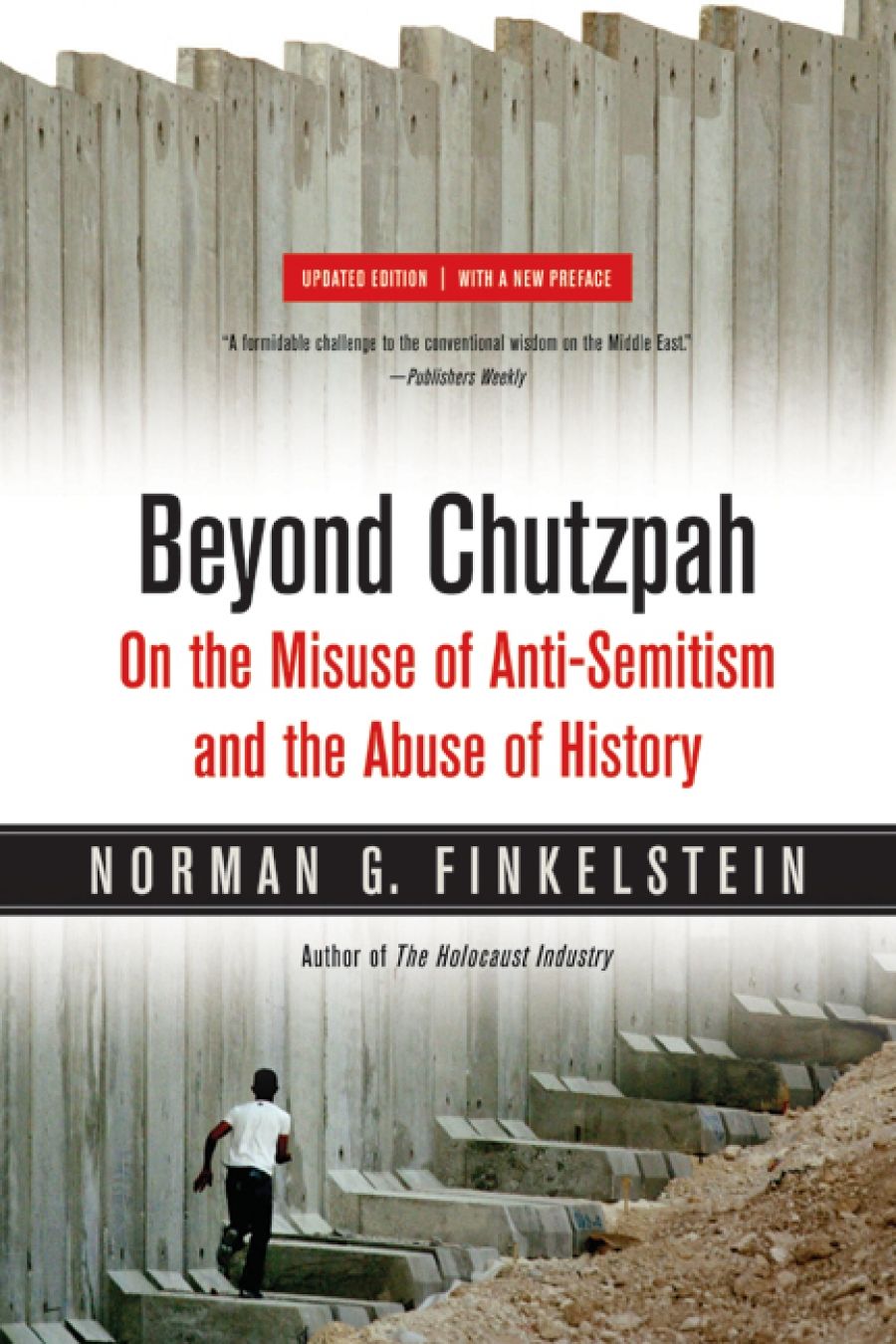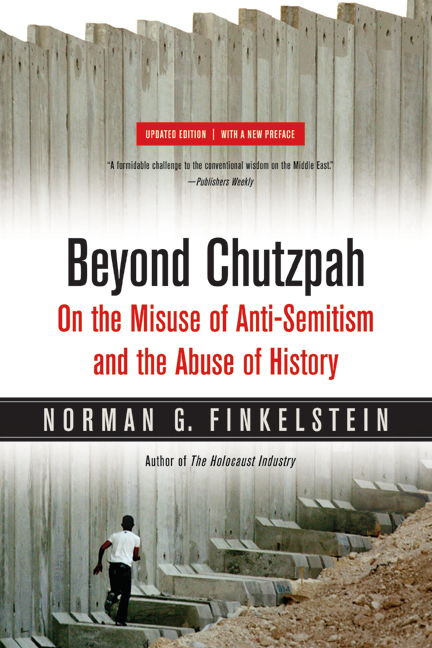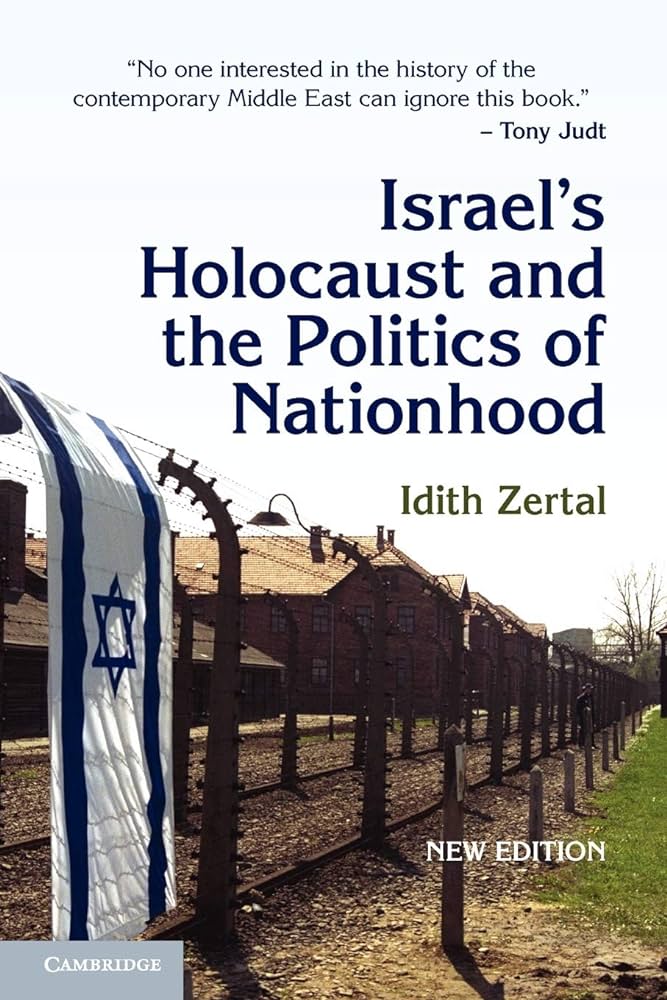
- Free Article: No
- Contents Category: Non-fiction
- Review Article: Yes
- Article Title: ‘A beautiful shoah’
- Online Only: No
- Custom Highlight Text:
Beyond chutzpah is a long, tedious and barely readable rant, known less for its content than for the childless controversy it succeeded in provoking. Despite the promise of its subtitle, the book makes no meaningful attempt to describe or to understand the misuses of anti-Semitism. It is, instead, an obsessive assault on another book, The Case For Israel (2003), by the Harvard law professor Alan Dershowitz, who has gained prominence for defending O.J. Simpson, Mike Tyson, Klaus von Bülow and, more recently, Israel.
- Book 1 Title: Beyond Chutzpah
- Book 1 Subtitle: On the misuse of anti-semitism and the abuse of history
- Book 1 Biblio: Verso, $35 hb, 332 pp
- Book 1 Cover Small (400 x 600):

- Book 1 Cover (800 x 1200):

- Book 2 Title: Israel’s Holocaust and the Politics of Nationhood
- Book 2 Biblio: CUP, $59.95 hb, 236 pp
- Book 2 Cover Small (400 x 600):

- Book 2 Cover (800 x 1200):

The crux of the controversy was that Finkelstein accused Dershowitz of lifting sections of Joan Peters’ book, From Time Immemorial (1984), which itself caused a minor furore two decades ago when it was accused of making questionable claims about the history of the Arabs living in Palestine in 1948. Finkelstein also claimed Dershowitz’s book had been ghost-written – a claim he later retracted – and described The Case for Israel as a ‘spectacular academic fraud’, saying that it ought to have had ‘the same shelf life as the latest publication of the Flat-Earth Society’. Dershowitz was suitably incensed. He wrote to the governor of California, Arnold Schwarzenegger, asking him to try to encourage the book’s publisher, the University of California Press, to terminate it. He asked a prominent law firm to write to the university’s provost and editorial committee. He threatened a defamation suit and said that Finkelstein was ‘like a child ... he makes up facts’. Eventually, after removing the claim that Dershowitz’s book was ghost-written, Finkelstein’s book was published. Dershowitz said that he was pleased: ‘I want to see [the book] demolished in the marketplace of ideas. I just want the false personal charges taken out.’
Dershowitz’s overreaction to the book was unjustified, ungratifying and ironic for an ardent proponent of civil liberties. The result is that, as this or any other review of Beyond Chutzpah will inevitably bear out, the controversy has overshadowed the book and given it a prominence that it does not deserve. At least, however, it gives a reviewer something to discuss: for Finkelstein’s book is pedantic, dull and inconsequential. It provides a long list of Dershowitz’s original claims about the Israel–Palestine conflict, and purports to refute them, mainly with references to public reports by human rights organisations. Most of the book reads like an extended footnote, an inconsequential attempt to prove a point.
Finkelstein, an assistant professor of political science at DePaul University in Chicago and the son of Holocaust survivors, does not shy from controversy. A previous book, The Holocaust Industry: Reflections on the Exploitation of Jewish Suffering (2000), argued that American Jews had exploited the Holocaust to promote Jewish and Israeli interests. The book was sharply criticised by a professor of European history at Brown University, Omer Bartov, for duplicating the arguments it sought to expose:
It is filled with precisely the kind of shrill hyperbole that Finkelstein rightly deplores in much of the current media hype over the Holocaust; it is brimming with the same indifference to historical facts, inner contradictions, strident politics and dubious contextualisations; and it oozes with the same smug sense of moral and intellectual superiority.
The smugness is again evident in Beyond Chutzpah, but any sense of research or originality is not. The most interesting thing about it is the title, which raises an important and fascinating topic that Finkelstein fails to address.
The issue as to when criticism of Israel descends into anti-Semitism is vexed, but this book does not go any way towards answering the question. Instead, in chapters titled ‘From Jesus Christ Superstar to The Passion of the Christ’ and ‘Crying Wolf’, Finkelstein attacks American Jewish organisations, leaders and publications for concocting the threat of a new anti-Semitism in an attempt to bolster support for Israel. The treatment, cursory and trivial, reads like one of those tired newspaper columns that does nothing more than attack other columnists.
In an age when all forms of racism are universally derided, it would be hard to think of a proper or correct use for anti-Semitism. In that sense, the suggestion that anti-Semitism could be misused is oxymoronic. But Finkelstein’s subtitle refers to a new form of anti-Semitism, which he sometimes signals with the use of inverted commas. This is an anti-Semitism that does not involve persecution of Jews, though its precise definition is never made explicit. The examples given seem to suggest that the new anti-Semitism involves either the fabrication of anti-Semitism for an improper and particularly political purpose, namely the promotion of Israeli interests, or accusations of anti-Semitism against legitimate critics of Israeli government policy.
The use of anti-Semitism as a term of opprobrium thrown at anti-Israel critics is dangerous because, if misused, it can stifle debate. But the misunderstandings between Finkelstein and his critics appear to stem from the unfortunate fact that neither he nor the false accusers make any attempt to understand the ideological standpoint that motivates so much discussion of Israel.
In an oft-quoted formulation of the difference between anti-Semitism and anti-Zionism, the New York Times commentator Thomas Friedman has written: ‘Criticising Israel is not anti-Semitic, and saying so is vile. But singling out Israel for opprobrium and international sanction is anti-Semitic, and not saying so is dishonest.’
But Friedman’s definition seems to go too far. The opposite of legitimate criticism of Israel is not anti-Semitic criticism, but illegitimate criticism. And for those who view Israel as a symbol for the exercise of power, not all criticism of Israel that is illegitimate is anti-Semitic.
There is much criticism of Israel that may be ill-considered, disproportionate or in bad faith, but this is not necessarily a sign that the critic is anti-Semitic. This is partly because Israel, like anti-Semitism, has inherited, at least since the 1960s, a secondary meaning. Israel is not merely a Jewish state, but a faultline on an enduring ideological debate that crosses the usual divide between left and right. Put crudely, this battle is between those who believe that power can be put to good use and those who believe that any imbalances of power – such as between the rulers and the ruled or strong states and weak – can (and must) be overcome. For the former, power, while susceptible to misuse, is not inherently immoral; it can be hijacked by evil, but it can also be harnessed to spread freedom and to favour the masses and the weak. For the latter, on the other hand, all forms of power are inherently wrong and ought to be perpetually opposed and mistrusted. Were it possible, centralised forms of power would be dismantled, because decisions by institutions such as armies, corporations, banks or governments will tend to favour the institution rather than the people.
This debate has its origins in the battle between isolationists and internationalists in the United States and – as the war in Iraq has demonstrated – has become more relevant as American power has increased. Two events have seen the Israeli–Arab conflict emerge as one of its most glaring flashpoints.
In the 1960s, during the peak of the Cold War, Israel became closely allied with the United States. The USSR had made alliances with the Arab states, and the United States saw its relationship with Israel as an opportunity to gain a foothold in the region. When the Cold War ended, and America emerged as a largely unchallenged global superpower, opposition to Israel stood as a proxy for opposition to the United States and its new-found unfettered power. In 1967 Israel won a short war against its neighbouring Arab states and seized the West Bank and Gaza. In the process of defeating its larger neighbours and then holding the land it had seized, it lost any entitlement to underdog status and became an occupier whose every crime was not merely a reflection of human failing or political short-sightedness but potential fodder for those who believe that both power and the United States are corrupt.
Some critics of Israel, particularly in the West, view the Middle East, consciously or not, against this backdrop. For them, the political intricacies and complexities that plague attempts to resolve the conflict between Israel and the Palestinians – the long and varied histories, the oversized personalities, the accidents, mistakes and misunderstandings – are either absent or irrelevant. Instead, the battle is a shallow one between a rifle-holder and a stone-thrower, an army and a militia, a government and a people, an authoritarian and a rebel, a hypocrisy and a cause. Of course, this myopia has its flipside. Israel’s overzealous advocates have their own blindsides, but critics such as Finkelstein view the conflict through a prism in which moral clarity is, and can only exist, on one side. This worldview creates an automatic and disproportionate response to Israel that is illegitimate and prejudicial – even if its origins are not based on traditional anti-Semitism.
DROP CAP
In Israel’s Holocaust and The Politics of Nationhood, Idith Zertal, a teacher at the Hebrew University of Jerusalem, picks up on a similar theme to that addressed by Finkelstein in The Holocaust Industry and examines the use of the Holocaust by the early Zionist leadership. Implicitly, any such political use of the twentieth century’s most shameful tragedy is a misuse; and Zertal’s book provides a scathing portrait of the state’s founding fathers, particularly the first prime minister, David Ben-Gurion, who, she argues, picked and chose symbols and events from the Holocaust to suit his plans for strengthening the state. But Zertal’s book makes no reference to Finkelstein and is in a different genre. Its rightful place is alongside works by the so-called ‘New Historians’, a group of Israeli historians who emerged, separately, in the 1980s and 1990s, with studies that re-examined some of the accepted foundations of Israeli history, particularly the role of the Israeli army in the expulsion of Palestinians during the 1948 War of Independence and the failure of the government to seek opportunities for peace with neighbouring Arab states. Unlike these historians, who based much of their work on newly declassified archival material, Zertal describes herself as a cultural historian and bases much of her work on speeches, newspapers, journals and previous historical accounts.
Unlike Finkelstein, Zertal is more obsessed with understanding and retelling history than scoring points in a broader debate. There are fascinating accounts of the trials of Jewish collaborators, who were dobbed in by survivors under an Israeli law that was initially intended to apply to Nazis. The trials raised difficult questions, pitted neighbours against each other, and forced Israeli courts to weigh up the morality of prosecuting barbaric acts by Jewish leaders in the concentration camps, who were themselves victims. This culminated in the indictment in 1953 of Dr Israel Kastner, who belonged to Ben-Gurion’s party and whose trial may have resulted in the party’s poor result in the third Israeli election. According to Zertal, Ben-Gurion used the Eichmann trial to expunge the shame of the Kastner trial and to highlight and exaggerate to the world the significance of the alliance between the Palestinian leader, Haj Amin El-Husseini, and the Nazis. The spectacular capture and trial of Eichmann, Zertal claims, was transformed by Israeli intellectuals and politicians into evidence of ‘a new kind of Israeli manliness, masculinity’.
Zertal’s demonstration that the Holocaust has been a constant presence in Israeli debate and in the nation’s self-image is hardly a surprise, but her well-paced record of incidents and anecdotes provides an absorbing insight into the fiery battles that have raged in Israel’s short history.
Comparisons of political foes with the Nazis – or, worse, with Neville Chamberlain – are not an Israeli phenomenon and can halt an argument in any language or any country. In recent times, the Taliban, Saddam Hussein, Osama bin Laden and the Iranian régime have all had their share of Nazification. But the comparisons take on a particularly grave tone in the state founded on the Holocaust’s ashes. For this reason, as Zertal’s numerous examples show, they have been bandied about, uncaringly, to whip up rhetorical frenzy towards both external enemies such as the Arabs and internal political enemies.
Aside from some occasionally unnecessary theoretical scaffolding dealing with the significance of memory in national identity, Zertal’s book reads more like a series of historical essays than an academic treatise. In the proper form of the essayist, she leads us slowly to the truth in a way that makes us think we have found it for ourselves. The climax, near the end of the book, is an extract from an article in a right-wing journal, Nekuda. The journal generally engages in what Zertal calls ‘industrial-scale exploitation of the Holocaust by the settlers’. But Zertal discovers a dissenting article, by the journalist Uri Orbach, which satirises the journal’s constant preoccupation with comparing Yasser Arafat and the Arabs to the Nazis:
Oh, what a beautiful shoah. How wonderful it is to use terms from another world in one’s argument. It’s frightening, it’s intimidating … Those who want to view the world in only two colours, black and black, should keep their colour blindness to themselves.
Zertal describes the article as the journal’s ‘lone cry’ against the exploitation of the Holocaust. It could, in another setting, apply just as easily to any writer who drowns thought and reason in the conduct of a personal or ideological vendetta.


Comments powered by CComment